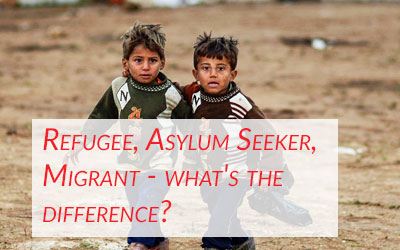Since the summer of 2015, the so-called ‘Refugee Crisis’ has had lots of column space. The plight of hundreds of thousands of people fleeing overseas has been well documented. Peoples from Syria, Kosovo, Eritrea, Albania, Senegal, Afghanistan, Somalia and other countries are running from violence and danger in their home countries and attempting to find a safe haven abroad. Such large movements of people in such a small space of time has attracted lots of public attention and had enormous effects on destination countries in the E.U. Borders have been closed, politicians have panicked and the media have gone into a frenzy.
The phrases ‘European Refugee Crisis’ or ‘European Migrant Crisis’ have come into common parlance, but neither phrases truly reflect the state of events accurately. To understand why, it is important to understand what the words ‘refugee’ ‘migrant’ and ‘asylum seeker’ actually mean.
Asylum Seeker
An asylum seeker is someone who has fled from their home country and is seeking protection (asylum). They have applied for asylum under the 1951 Refugee Convention on the Status of Refugees, on the grounds that if they returned to their country of origin they are likely to face persecution, be caught up in armed conflict or face severe violations of their human rights simply because of their race, religion, nationality or political beliefs. An asylum seeker, unfortunately, has not yet found asylum. They are still seeking it and awaiting a decision on their application for asylum.
Refugee
A refugee is someone who has been granted protection and refuge. Mainly, an asylum seeker who has been granted asylum becomes known as a refugee. Refugees have fled their countries because their own governments cannot protect them. Sometimes their own governments have actively persecute them. Their human rights have been systematically abused to such an extent that they cannot remain in their country of origin any longer and have been granted protection from a sympathetic country.
Migrant
A migrant, simply put, is a person who has left their home country in order to live in another country. They may have moved for study or relocation. Those who may have moved in search of a job or a better standard of living are often called ‘economic migrants’. A migrant has the option to return home should they choose; they can count on their government, they can plan a safe passage to another country and say goodbye to their friends and family before departure.
To call the current crisis in Europe a ‘Refugee Crisis’ indicates that all those travelling have been granted a safe haven and support from a sympathetic country, whilst nothing could be further from the truth. For example, though an estimated 4.3 million Syrians have fled abroad, by the end of 2015 the UK had only just reached its target of granting refugee status to 1,000 Syrians. That’s about as many people fit into a busy London tube train. Calling displaced people ‘migrants’ make it seem as though they are only fleeing to look for a slightly easier time or a better job, rather than fearing their lives. As stated, a migrant can count on their government or plan safe passage. Current displaced peoples make unsafe passages to find refuge; they risk their lives in overcrowded dinghies and lorries in the hopes of eventually finding safety. So, what’s in a name? Plenty, it would seem! Perhaps together we can come up with a better name for the current crisis of displaced peoples Europe is currently experiencing.

